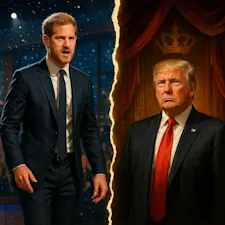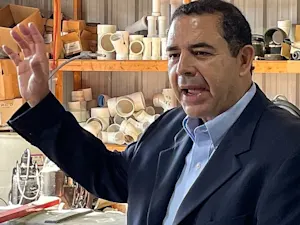
Trump Breaks With Pentagon: 'Nothing Stops Reporters'
Pete Hegseth speaking with attendees at the 2021 Student Action Summit hosted by Turning Point USA at the Tampa Convention Center in Tampa, Florida. Photo courtesy of Gage Skidmore under CC BY-SA 2.0.
Donald Trump pushed back on a Pentagon policy drafted by his own Defense Secretary, Pete Hegseth, that would require reporters covering the Department of Defense to get prior approval before publishing any information — even if it is unclassified. The policy also reportedly threatens to revoke press credentials for journalists who refuse to comply. This rare clash between Trump and one of his appointees has drawn attention to the ongoing tension over media access and transparency at the Pentagon.
Trump's Rebuke of Pentagon Press Restrictions
As he prepared to travel to Arizona for a memorial event, President Trump was asked whether the Pentagon should have a say in what reporters cover about national defense. Trump's response was blunt: he said no and insisted that "nothing stops reporters" from doing their job, as reported by POLITICO. His remarks came shortly after the Pentagon circulated a 17-page draft policy that would require journalists to sign an agreement pledging not to report on unauthorized information. Violators risk losing their Pentagon building passes and access to press briefings.
The policy, announced by Defense Secretary Pete Hegseth, also restricts reporters' movement inside the Pentagon. Journalists would be barred from several floors unless accompanied by a government escort, as reported by TIME, a significant departure from decades of precedent where reporters freely roamed the building and press offices of various military branches.
Hegseth's Defense of the New Rules
Hegseth defended the restrictions on social media, emphasizing that the Pentagon is run by "the people," not the press, as reported by TIME. He insisted that reporters must "wear a badge and follow the rules — or go home." The new rules come amid a series of leaks and unauthorized disclosures that have frustrated the Pentagon leadership, including a high-profile incident where the editor-in-chief of The Atlantic was accidentally added to a Signal group chat containing sensitive military plans.
The Pentagon's move also follows a controversial media rotation program initiated earlier in the year, which removed several established news organizations from Pentagon offices and replaced them with a mix of conservative and progressive outlets. This reshuffling has added to the perception of a tightening grip on press access under Hegseth's leadership.
Journalists and Press Freedom Advocates Push Back
The new policy has drawn sharp criticism from journalists and press freedom groups. According to POLITICO, Mike Balsamo, president of the National Press Club, called the restrictions a "direct assault on independent journalism" at the place where scrutiny matters most — the U.S. military. He warned that if news about the military must first be approved by the government, the public will only receive what officials want them to see, not independent reporting.
Kevin Baron, a former Pentagon reporter and vice president of the Pentagon Press Association, described the policy as an "intimidation tactic" designed to "kill transparency," as reported by TIME. He noted that for decades, Pentagon reporters have had the freedom to move about and report without signing restrictive agreements, except in rare cases involving operational security in conflict zones.
Seth Stern of the Free Press Foundation called the policy "fundamentally un-American," arguing that it amounts to prior restraint on publication, which is one of the most serious First Amendment violations, as reported by TIME. Stern urged journalists not to comply if it means sacrificing their independence.
The Contradiction Between Trump and Hegseth
The public disagreement between Trump and Hegseth highlights a striking contradiction. While Hegseth pushes for strict oversight and control over what reporters can access and publish, Trump claims that "nothing stops reporters." This personality-driven feud has overshadowed the policy's implications for Pentagon transparency.
Trump's comments also come amid his broader attacks on the media, where he has accused journalists of producing "illegal" and "cheating" content, claiming that "97 percent" of news coverage about him is negative and biased, as reported by The Daily Beast. Yet, on the Pentagon press restrictions, he appears to defend the principle of free reporting, at least in this instance.
What's Next for Pentagon Press Access?
It remains unclear whether Trump's public pushback, will lead to the scrapping or softening of the Pentagon's new press restrictions. The White House and Department of Defense have not issued official comments responding to the controversy. Meanwhile, press freedom advocates continue to monitor the situation closely, warning that the policy could set a dangerous precedent for government control over independent journalism.
The Pentagon's new rules come at a time when the relationship between the military and the press is under intense scrutiny. The balance between protecting national security and ensuring transparency is delicate, and this latest clash between Trump and Hegseth adds a new layer of complexity.
For now, reporters covering the Pentagon face a choice: comply with the new restrictions and risk compromising their independence or forgo access and challenge the policy. The outcome of this standoff could shape how the public receives information about the nation's defense in the months and years ahead.
A Rare Rift in Trump's Inner Circle
The disagreement between Trump and Hegseth is notable because it exposes a rare rift within the president's own administration. Hegseth, a former Fox News host and Trump appointee, has been a vocal advocate for conservative media and a staunch defender of the administration's policies. Yet, on this issue, Trump has publicly distanced himself from Hegseth's approach, signaling a potential shift or at least a public airing of internal tensions.
This unusual public rebuke raises questions about how much influence Hegseth's policies will ultimately have and whether Trump's stance will embolden reporters to resist the new rules.
The Stakes for Pentagon Transparency
The Pentagon's press restrictions are more than just a bureaucratic policy change. They touch on fundamental questions about government accountability, the public's right to know, and the role of the press in a democracy. The Pentagon, as the nation's largest military institution, has long been a focal point for investigative journalism and public scrutiny.
If the new rules stand, they could limit journalists' ability to report independently on military affairs, potentially reducing transparency and public trust. If they are rolled back or softened, it could signal a reaffirmation of press freedoms even within sensitive government domains.
As this story unfolds, the eyes of the media world and the public remain fixed on the Pentagon, watching to see whether the press will maintain its traditional access or face new barriers under the guise of national security.
The clash between Trump and Hegseth is a vivid reminder that even within the highest levels of government, personalities and politics can shape policies that affect the flow of information to the American people.
References: Trump Bashes Hesgeth's Wild New Restrictions on Pentagon Reporters | Pentagon Accused of 'Intimidation' With Media Restrictions | TIME | Trump on Pentagon restrictions for the press: 'Nothing stops reporters'






















